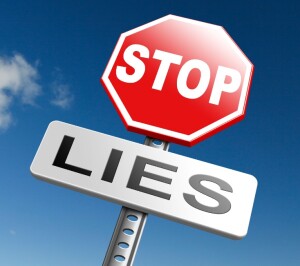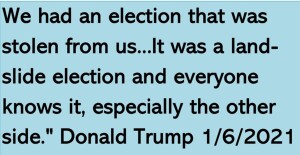Is it a sin to vote for an “election denier?” Yes, if…
Did you hear the story of the Irishman Paddy who fell and hit his head. His friends gathered around him and, unable to rouse him, pronounced him dead. They put him in a coffin and carried him to the graveyard. On the way to the cemetery, the pallbearers slipped and dropped the coffin. Paddy, jolted awake by the fall, sat up and said, “Hey fellas, what’s going on?” His friends shouted back, “You’re dead!” They pushed him back down into the coffin, nailed it shut, and proceeded on to the cemetery.
Moral: When a rigidly held belief bumps into solid facts, the rigidly held beliefs usually win.
Dear readers, I’m not making a political and partisan argument here, but a moral one. Bear with me.
“Election Deniers!” It is hard to believe, but the numbers are legion. Against all the evidence, they spout the lie created and perpetrated by the former president that the 2020 presidential election was stolen! That he, Donald J. Trump, is the rightful president. And that Joe Biden, the current occupant of the White House, is there by fraud.
NOTHING COULD BE FURTHER FROM THE TRUTH. Donald Trump’s own cyber security chief stated that it was the safest election (safe from fraud) in US history. 60 of 61 court filings by Trump lawyers and supporters to challenge the election results were thrown out as were two appeals to the US Supreme Court. And now, with the testimonies of many former Trump staffers and Republican party leaders to the January 6 congressional committee, including statements from his former attorney general, Catholic Bill Barr, we know that Trump was told that the election was fairly won, that he admitted it in private that it was fairly won, and that he still refused to publicly accept the results. In fact, he had a premeditated plan dating back to months before the election to plant the notion that the only way that he could lose the election is by fraud.
Joseph Goebbels, Hitler’s propaganda minister, once said, “If you tell a lie big enough and keep repeating it, people will eventually come to believe it. The lie can be maintained only for such time as the State can shield the people from the political, economic and/or military consequences of the lie. It thus becomes vitally important for the State to use all of its powers to repress dissent, for the truth is the mortal enemy of the lie, and thus by extension, the truth is the greatest enemy of the State.” (Inspiringquotes.us)
 In the Catechism of the Catholic Church, lying is defined as a sin, and the gravity of a lie is measured by the “truth it deforms, the circumstances, the intentions of the one who lies, and the harm suffered by its victims.” It follows that a lie that “does grave injury to the virtues of justice and charity” is a mortal sin (Art 2484). The “big lie” that the 2020 election was stolen does such “grave injury” because it greatly undermines “justice and charity,” thereby eroding trust in democracy. (I think Catholic bishops, clergy, and lay leaders must publicly condemn this lie and tell the Catholic community the truth that Joe Biden is the legally and fairly-elected president of the United States.)
In the Catechism of the Catholic Church, lying is defined as a sin, and the gravity of a lie is measured by the “truth it deforms, the circumstances, the intentions of the one who lies, and the harm suffered by its victims.” It follows that a lie that “does grave injury to the virtues of justice and charity” is a mortal sin (Art 2484). The “big lie” that the 2020 election was stolen does such “grave injury” because it greatly undermines “justice and charity,” thereby eroding trust in democracy. (I think Catholic bishops, clergy, and lay leaders must publicly condemn this lie and tell the Catholic community the truth that Joe Biden is the legally and fairly-elected president of the United States.)
You may recall that in the 2020 presidential race between Donald Trump and Joe Biden, there were some Catholic clergy and laity giving homilies and making social media posts that it was a sin to vote for a Democrat. I objected to these homilies and social media posts as being inconsistent with Catholic teaching. Here’s what Joseph Ratzinger, later Pope Benedict XVI, wrote:
A Catholic would be guilty of formal cooperation in evil, and so unworthy to present himself for Holy Communion, if he were to deliberately vote for a candidate precisely because of the candidate’s permissive stand on abortion and/or euthanasia. When a Catholic does not share a candidate’s stand in favour of abortion and/or euthanasia, but votes for that candidate for other reasons, it is considered remote material cooperation, which can be permitted in the presence of proportionate reasons. (Worthiness to Receive Holy Communion: General Principles. Cardinal Joseph Ratzinger, 2004)
So, is it a sin to vote for a politician that promotes the “big lie” that the 2020 election was stolen? The answer, consistent with Catholic moral teaching is, “Yes” if a reason one is voting for a politician is because he/she is a proponent of the “big lie.” One may vote for an election denier if one has other morally valid reasons to vote for him/her. However, to vote for an election denier, in part, because he/she is an election denier, would be a sin, as defined in Catholic teaching.
What about people who sincerely believe that the 2020 election was stolen? Are they guilty of sin if they vote for an election denier precisely because he or she is an election denier? Yes! When a person refuses to adopt a position because of a rigidly held belief, even though the facts are glaring that the rigidly held position is wrong, that person is guilty of willful ignorance. Holocaust deniers are guilty of the sin of that great lie. Advocates who deny that the unborn fetus in a mother’s womb is a baby are guilty of the sin of that great lie. And individuals and groups who refuse to accept the glaring evidence that the 2020 election was freely and fairly won by Joe Biden and deliberately vote for election deniers are guilty of the sin of that great lie.

Robert: Lots of food for thought.
There are numerous examples of how political values do not overlap with the values taught by Jesus.
Politics by its nature is a compromise of values of various constituencies.
Jesus:
28 “What do you think? There was a man who had two sons. He went to the first and said, ‘Son, go and work today in the vineyard.’(A)
29 “‘I will not,’ he answered, but later he changed his mind and went.
30 “Then the father went to the other son and said the same thing. He answered, ‘I will, sir,’ but he did not go.
31 “Which of the two did what his father wanted?”